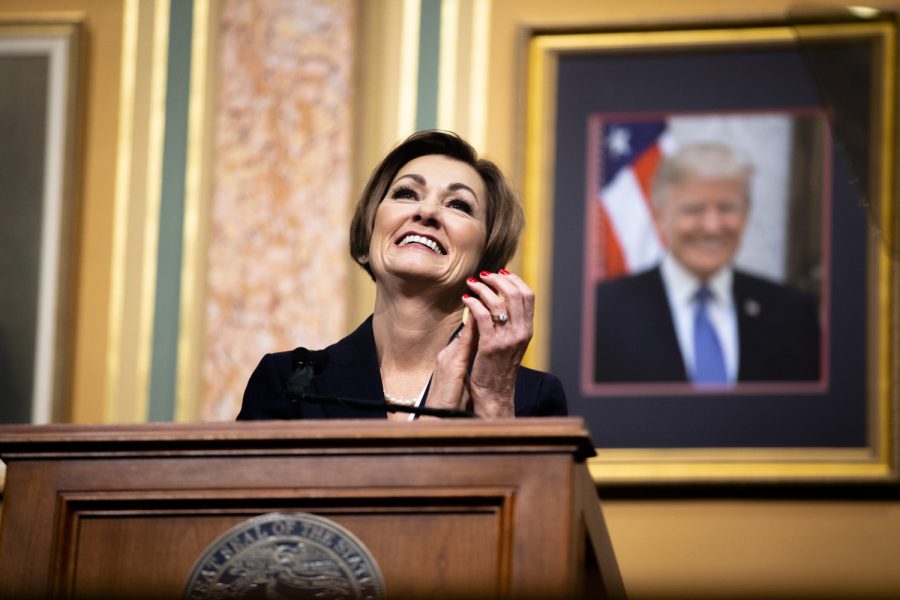Opinion: Kim Reynolds is right to refrain from shelter-in-place order
Gov. Kim Reynolds is right to not entirely shut down the state of Iowa during this time.
Gov. Kim Reynolds smiles during the Condition of the State address at the Iowa State Capitol on Tuesday, Jan. 14, 2020.
April 8, 2020
On Monday, Governor Reynolds expanded the list of businesses that must be shut down until the end of the month. These drastic and economically draining measures are not good enough for some. The mayor of Iowa City and Johnson County officials have repeatedly called for a shelter-in-place order.
Perhaps those clamoring for harsher restrictions should lock themselves in their own homes and stop trying to impose more government control over what everyone else is doing. Most of our workforce does not have the luxury of clocking in on their laptops at home.
Most workers derive a sense of purpose from their jobs. For many recovering drug addicts and alcoholics, going to work cultivates structure in their lives and keeps them sober. No unemployment check can fill that void.
Restaurants fulfilling to-go orders are among the few businesses that are still allowed to operate. Many restaurant owners are barely keeping their heads above water and they need carryout business to keep them afloat.
It doesn’t matter how many profligate spending bills are passed on Capitol Hill, it is simply impossible for their bailouts and loans to keep every business and individual from drowning financially. These state-imposed business restrictions must be lifted whenever it is safe to do so, and not one minute later.
Nineteenth-Century libertarian economist Frédéric Bastiat wrote that when laws become too pervasive and overbearing, reasonable people will become disgruntled and ignore them altogether. This is exemplified by New Yorkers irresponsibly crowding together in parks despite strict social distancing orders from Gov. Andrew Cuomo and Mayor Bill de Blasio.
Reynolds has a 12-point system to determine if and when to issue a stay at home order. Such an escalation of economically detrimental restrictions should be prudently and objectively based on metrics, rather than public indignation and political hand wringing. Reynolds explained that while the name of the order is irrelevant, it’s the substance that matters.
In Pennsylvania Anita Shaffer, 19, was pulled over on March 29 for supposedly driving with a bad tail light — which she alleges was actually fine when she checked it. Shaffer was fined $202 for violating her state’s stay at home order by going for a leisurely drive, even though she never got out of the car and never intended to. Fortunately the York County District Attorney dropped the frivolous citation amid negative publicity.
Some states, including Vermont, have even prohibited consumers from buying arbitrarily designated “non-essential” products such as bug spray, which might be crucial for some as temperatures rise.
The Governor’s current restrictions limiting gatherings to 10 people and closing certain businesses are sufficient enough. It’s not “essential” that Iowa hunters leave their homes for turkey hunting this week, but prohibiting it would be a grossly unnecessary violation of their rights.
Many of the statewide blanket orders such as “stay at home” or “shelter in place” fail to consider the nuance of people in sparsely populated areas who clearly pose no risk to public health by leaving their homes.
No government response to a public health crisis is ever perfect, but Kim Reynolds’ decisive leadership in these tough times has been admirable. I consider myself lucky to live in one of few states where the governor has prioritized economic freedoms and civil liberties in crafting policies to mitigate the spread of COVID-19.














